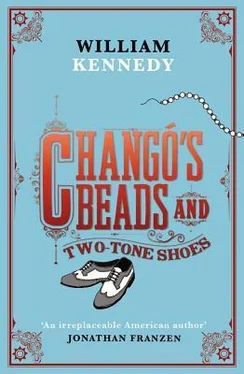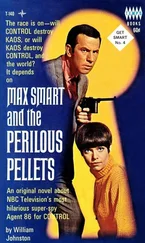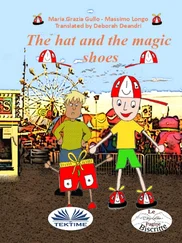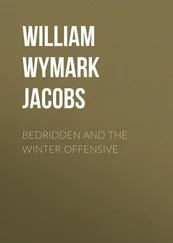Dayddle-dayddle-deedle-dahddle seneday’s beem. .
Dah day tour-it’s-in-his-dream. .
Dig dig the deep peninsulate deem. .”
Bing was funny and he sang fast, very, very fast, baby talk, crazy talk. Quinn couldn’t repeat a single word, except diddle, but Bing’s words must mean something. Quinn would have to find out. What good was there in secret language like that? Quinn couldn’t say. But it was a wonderful song and he loved its beat and its mystery and he loved Bing’s voice and Cody’s voice and his piano. He loved everything about what he was seeing and hearing. Loved it.
Max came out of a second parlor with a camera and took pictures of Cody and Bing. Then Cody played alone, breathing out loud, humming in time with his own tempos — a boogie-woogie beat, a plunge into a left-handed bass solo, a rushing, double-handed domination of the entire keyboard, no phrase unfinished, every note on the money, no such thing as a wrong note from the magical hands of a maestro who hummed and he hummed and then he hummed very hard and then he slowed, and Cody sang: “Just because my color’s shady,”
And Bing sang: “You’s a shady baby,”
Then they both sang: “That’s the reason, maybe,
Why they call me shine.”
Slam, bang.
The end.
Cody turned to look at Quinn. “Shine,” he said.
“Shine,” Quinn said, nodding and wanting to say what he didn’t know how to say, no words about those words, that music. “That was good.”
“Not too bad,” Cody said.
“It was great,” George said. “Great, great music. You may never hear anything like that again as long as you live, Danny.”
“Unless he hangs out with Cody and Bing,” Max said.
“Somebody’s got to record you, Cody,” Bing said.
“Oh, yeah, lotta people gonna record me,” said Cody, and he stood up. “Great playin’ for you, little man,” he said to Quinn. “You hear the music. You’re gonna be all right.”

Quinn met Renata the same night he summoned the courage to talk to Hemingway. She too had come to El Floridita to see the great writer, in part because Alejo Carpentier, who was beginning to fall in love with her, spoke well of the man from their days in Paris and thought The Sun Also Rises was masterful. Renata had read much literature and believed she might one day write a novel and would feel stupid if she could have talked to a major living novelist but had not. She had seen Hemingway looking at paintings in the Palacio de Bellas Artes where she worked with artists, studied art, and served as a tour guide, a volunteer. She had no need for salaried work; her family owned two sugar mills on her father’s side and tobacco on her mother’s. Renata was twenty-three and for more than a year had been living a dual life: as an haute bourgeoise in the heady Cuban social swirl, and, clandestinely, as an associate of revolutionaries who were working to overthrow the government of Fulgencio Batista. One of her revolutionary friends had fought with the Republicans in Spain and later with the American army in World War Two; and he admired Hemingway for being unafraid to dodge bombs in the streets of Madrid. Her brother-in-law, Max, knew Hemingway and Max told her yes, if you approach him at the Floridita in the right way he may talk seriously to you, but it would be better if he was a few daiquiris in before you approached, for the rum brings out his friendly side; he has other sides and it’s better to wait for the rum to do its work so you can avoid those.
Quinn had been in the Floridita almost two hours. He’d been in Havana a week and had come to the Floridita three nights in a row to wait for Hemingway, who never turned up. Then tonight here came the man, alone. He sat on a barstool in his corner, a bronze bust of himself on a high shelf over the end of the bar, and he chatted with the bartender. But he also turned his back on two people who approached him. Quinn waited, and when he saw him smile and wave at someone across the room he decided this was the moment. He stood up and made eye contact and by the time he was standing in front of Hemingway he was saying, “I’m Daniel Quinn. I just quit the Miami Herald to write a novel and you’re responsible for me being out of a job. Does it bother you how many reporters you’ve led into poverty?”
“Did you eat today?” Hemingway asked, frowning with his eyes.
“I had breakfast.”
“You had breakfast and you’re drinking rum at the best bar in Havana and you’re crying poverty?”
“I was exaggerating to make a point.”
“Keep it up and soon you’ll have a novel,” Hemingway said.
His beard was white and so was what was left of his hair, and he wore a white guayabera with long sleeves. He still had his stomach but he was thinner than his photos and no longer the robust fisherman with the great chest and big shoulders.
“I may overcome my poverty,” Quinn said. “The Time correspondent here may use me as a stringer. You think I can get an interview with Batista?”
“El Presidente hijo de la gran puta, ” said Hemingway.
“You know him?”
“No thank you.”
“Will you write about him?”
“Not in this lifetime. What are you writing?”
“Grim stories about political exiles in Miami buying guns to send to Cuba,” Quinn said. “The grimness is redeemed by my simple declarative sentences.”
“Remove the colon and semicolon keys from your typewriter,” said Hemingway. “Shun adverbs, strenuously. What do you think of the woman who’s sitting at that far table?”
Quinn looked at the young brunette sitting at one of the square wooden tables, sharp nose, large black eyes, full lips in a curvaceous smile that was radiant, her black hair falling just below her shoulders and with a natural wildness in its curl. She was slender, in a white blouse, tan skirt, and sandals.
“She is spectacularly beautiful,” Quinn said. “I could fall in love with her right now. I might marry her.”
“The young man was last seen charging into the unknown at full speed,” Hemingway said, “a valiant but rash course of action. If you marry a woman like that, when do you write your novel?”
“After the honeymoon,” Quinn said.
“Who do you think she looks like?”
“Your daughter Ava Gardner.”
“You are clearly a born novelist,” Hemingway said.
The beautiful brunette had come in with a man maybe twenty years her senior and they were talking head to head. He was tall and thin, well-tailored in a tan cord suit that his shoulders filled out, white shoes, and yellow tie, a handsome figure who seemed overdressed for the very warm and humid night. He was giving close attention to the young beauty, and it was these two who had drawn the wave from Hemingway.
“What is her relationship to the man?” Hemingway asked.
“Close, but he wants it closer.”
“You are closing in on chapter six.”
“You know her? I saw you wave to her.”
“I waved at the man, Max Osborne,” Hemingway said. “He works in your abandoned profession — an editor at the Havana Post, very smart and also an American spy who talks about his spying to everybody. Some consider him a political buffoon but that seems to be his cover. I know a great deal about spying. I was a spy for several years and they called me a buffoon. They didn’t know twiddle about the Nazis I hunted. Soon Max will come over to talk to us.”
“Will he bring the girl?”
Читать дальше













